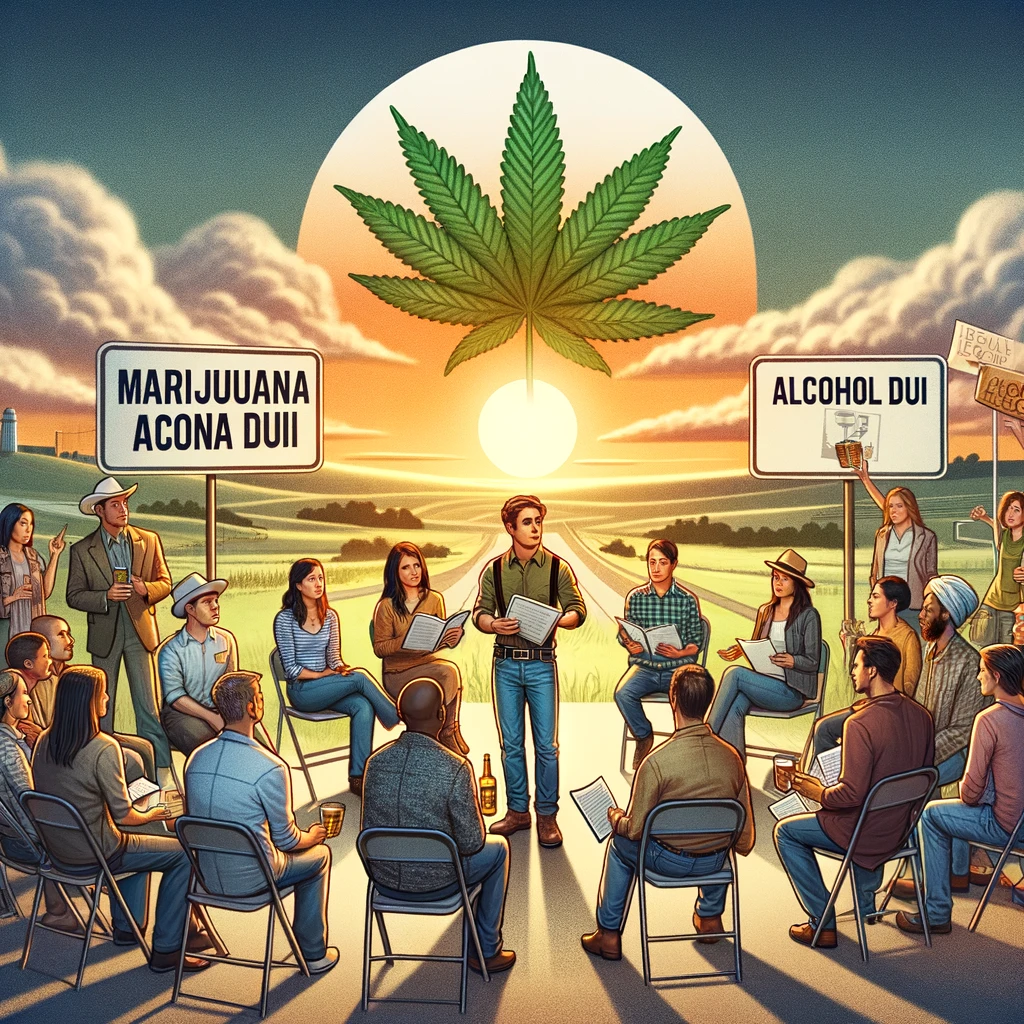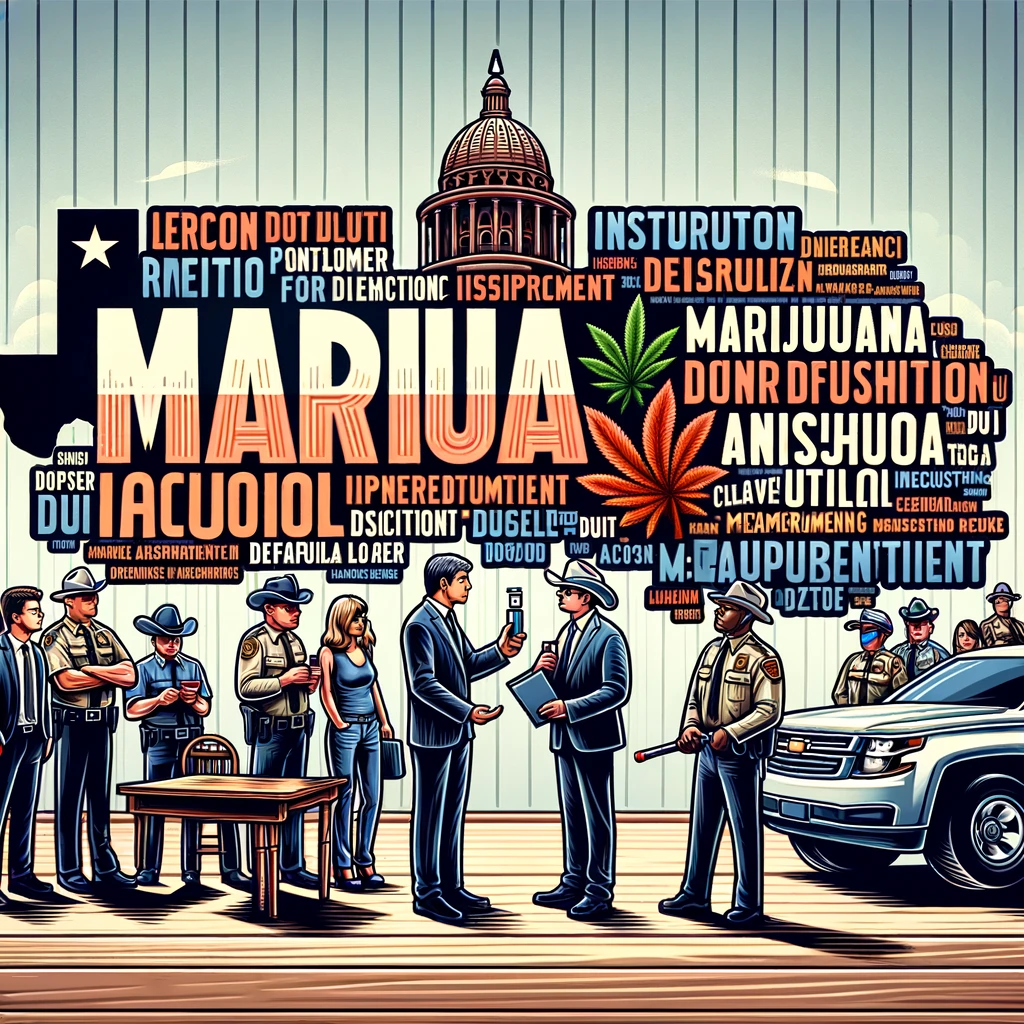
In Texas, the legal landscape surrounding DUIs is complex, especially when distinguishing between marijuana DUI and alcohol DUI. This article dives into the critical differences, providing clarity on this intricate topic. We’ll explore various facets, including laws, detection methods, and societal impacts. Comparing Marijuana and Alcohol DUIs in Texas for legal clarity.
Imagine
Cruising down a Texas highway, the sun setting in the rearview mirror. Suddenly, lights flash behind you. It’s the police. You’re not drunk, but there’s a lingering scent of marijuana in the car. Welcome to the confusing world of DUI laws in Texas, where the rules for alcohol and marijuana aren’t quite the same. In this lively guide, we’ll dive into the ‘Texas differences of marijuana DUI vs alcohol DUI’. Spoiler alert: They’re not twins, not even close!
Stick around, we’re comparing Marijuana and Alcohol DUIs in Texas
To uncover why understanding these differences can save you from a world of trouble. From legal jargon decoded to eye-opening real-life scenarios, this article is your roadmap through the legal maze. Don’t let ignorance be your downfall; let’s explore together!
Legal Definitions and Distinctions
Texas DUI laws are stringent. They cover impairment from alcohol and drugs, including marijuana. A marijuana DUI differs from an alcohol DUI primarily in how impairment is measured. For alcohol, a blood alcohol concentration (BAC) of 0.08% is the legal limit. There’s no equivalent for THC, making marijuana DUIs more subjective.
Officers use different criteria to identify impairment types. Observable signs are crucial for a marijuana DUI, while alcohol DUI often relies on BAC levels. This fundamental difference affects how cases are handled legally.

Detection Methods and Testing: Comparing Marijuana and Alcohol DUIs in Texas
Texas employs breathalyzers for alcohol detection. These are straightforward and provide immediate results. However, marijuana impairment lacks a similar quick test. Instead, officers may use field sobriety tests and later blood tests to detect THC levels. Yet, the reliability of these methods for determining actual impairment is debated.
The legal thresholds, such as BAC for alcohol, do not apply to THC. This discrepancy leads to challenges in enforcement and legal proceedings, making it a contentious issue in Texas law.
Effects of Alcohol vs. Marijuana on Driving
Studies show alcohol impairs judgment, motor skills, and reaction times. Marijuana affects driving differently, potentially altering time perception and decision-making. Comparing these effects is essential for understanding the risks and legal implications.
While alcohol’s impact on driving is well-documented, marijuana’s effects are still under research. This difference complicates legal arguments and public education efforts.

Penalties and Legal Consequences
Penalties for DUI in Texas are severe, with variations between alcohol and marijuana cases. Alcohol DUI penalties are well-defined, based on BAC levels and prior offenses. Conversely, marijuana DUI penalties can be less predictable due to the subjective nature of impairment assessment.
Both types can lead to fines, jail time, and license suspension. However, the specifics may vary, reflecting the legal system’s evolving stance on marijuana.
| Type of DUI | Penalties and Legal Consequences in Texas |
| Alcohol DUI | – Fines up to $2,000 for first-time offenders. – 3 to 180 days in jail. – Loss of driver’s license up to a year. – Annual fee of $1,000 to $2,000 for three years to retain driver’s license. |
| Marijuana DUI | – Fines up to $2,000 for first-time offenders. – 72 hours to 180 days in jail. – Loss of driver’s license for 180 days. – Possible mandatory drug education programs. |
Impact on Driving Records and Insurance
DUI convictions, whether for alcohol or marijuana, detrimentally affect driving records. This impact extends to insurance premiums, potentially causing significant increases. Additionally, DUIs can lead to participation in mandatory rehabilitation programs, affecting both personal lives and legal records.
Challenges in Enforcement and Prosecution
Texas law enforcement faces hurdles in proving marijuana impairment. The subjective nature of current testing methods leads to legal challenges. Moreover, the evolving legal landscape around marijuana complicates enforcement further.
In court, the role of expert witnesses becomes pivotal, especially for marijuana DUI cases. Their testimony can influence the outcomes significantly due to the subjective nature of impairment detection.

Public Perception and Social Impacts
Public attitudes towards marijuana and alcohol vary. These views influence societal impacts and legal outcomes of DUI charges. Employment, education, and social status can all suffer following a DUI conviction, with varying degrees based on public perception.
The societal views on DUI types differ, reflecting broader attitudes towards substance use. This perception impacts everything from legal processes to personal consequences.
Prevention and Education
Texas has initiatives aimed at DUI prevention. These include educational campaigns and resources for substance abuse treatment. Efforts are designed to reduce DUI incidents, though challenges remain in addressing both alcohol and marijuana impairment effectively.
Recent Changes in Law and Policy
Texas DUI laws evolve, especially with changing marijuana legislation. Recent updates may affect DUI enforcement and penalties. Keeping informed on these changes is crucial for understanding current legal implications and future trends.
Personal Stories and Case Studies
Real-life examples highlight the human aspect of DUI charges. Stories of individuals affected by both marijuana and alcohol DUIs shed light on the legal process and its impacts. These narratives can offer insights beyond dry legal facts, illustrating the broader societal implications.
In summary of comparing Marijuana and Alcohol DUIs in Texas
The differences between marijuana DUI and alcohol DUI in Texas involve complex legal, social, and personal layers. Understanding these nuances is essential for navigating the legal system and recognizing the broader impacts of these offenses.
And there we have it, folks!
A whirlwind tour through the maze of Texas DUI laws. Feel more enlightened? You should! Remember, whether it’s a night out with margaritas or a chill session with Mary Jane, Texas doesn’t play favorites. Both can land you in hot water. We’ve navigated the choppy waters of legal limits, penalties, and those sneaky sobriety tests. Now, you’re armed with knowledge, the best shield against DUI woes. Share this guide with friends; be the hero at the next BBQ. Keep it safe, keep it smart, and let’s keep those Texas roads as friendly as our smiles. Until next time, drive responsibly and stay curious!

Other Related Articles:
- DUI Checkpoints: Your Rights and Your Options
- The Cost Of a DUI Conviction
- Impact Of a DUI On Professional Licenses
- DUI vs. DWI: What’s the Difference?
- The Making of Bentley’s Law
- Pouring Responsibility: Understanding the Texas Dram Shop Act
- Texas Drug Trafficking: Laws and Penalties
- Out-of-State DUI Charges and Consequences
- DUI Expungement and Record Sealing In Texas
- High Stakes: Marijuana Use in Texas
Frequently Asked Questions:
Yes, you can be charged with a DUI for operating a vehicle under the influence of marijuana in Texas.
Yes, DUI typically refers to drivers under 21 not allowed to have any alcohol. DWI is for drivers with impaired abilities.
Drunk driving is a serious issue in Texas, leading to numerous accidents and fatalities each year.
Yes, Texas has strict DUI laws, including heavy fines, jail time, and license suspension for offenders.

